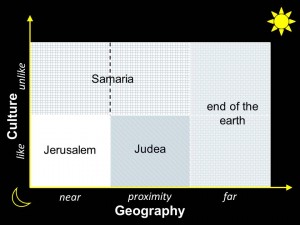So where does all this living strategically end?
Consider the last phrase of Jesus’ last statement to His followers before ascending back to heaven and being seated at the Father’s right hand: “But you will receive power when the Holy Spirit has come upon you, and you will be my witnesses in Jerusalem and in all Judea and Samaria, and to the end of the earth.” (Acts 1:8)
Think of that! With His last words Jesus told us this doesn’t end until the gospel has reached “to the end of the earth.”
But just what did Jesus mean by “the end of the earth”?
Like the other steps along this journey it must be understood both culturally and geographically. For the first century Jew, the landmass upon which I set as I write this (and upon which you probably sit as you read this) and the people who populated it would have been “the ends of the earth.” It is not likely they could have imagined that this part of the world existed; nor could they have comprehended the culture in which we now live.
So how do we (or any other Christ-follower at any other time and in any other place) identify what gospel-faithfulness “to the end of the earth” looks like?
The people living at “the end of the earth” are those who are far from you geographically and unlike you culturally. They are not near or even in proximity to you. You will have to “go” to them (Matthew 28:19-20) or you’ll never get the gospel to them. This will involve crossing barriers—and not only physical/geographical ones. Those will prove the easiest of the barriers to cross. The folks at “the end of the earth” probably won’t be speaking English, so you’ll face a linguistic barrier. They will likely don clothing that you wouldn’t be immediately comfortable wearing. They will think differently than you’ve been raised to think—looking at the world through internal eyes that begin from a different starting point than you do. What they value you may not; what you value they may devalue.
The people at “the end of the earth” are different than you. And you—as a gospel-carrier—are responsible to initiate crossing those divides. Which may lay bare the greatest barrier of all—the one that exists within your heart.
With the shrinking of our world and the instantaneous nature of communication these days, you may be wondering “Why not just do an email blitz?” Or “Let’s just get a satellite link-up and get this thing over!” Or “Just reduce the gospel to 144 characters and tweet it out!”
I don’t underestimate the potential of harnessing technology for the advance of the gospel, but I must underscore that this is a people-to-people transaction, a life-to-life transference. That can be enhanced by technology, but it cannot be replaced by it. If we ask technology to do for us what God tells us to do, we are not being faithful to the God who has saved and is sending us. We must beware of the very real possibility of hiding behind our technology—protecting our comforts and hiding our fears, rather than giving them all up to Jesus in sacrificial obedience to Jesus’ call.
So how do we all—each and every one of us as followers of Christ—faithfully fulfill the call of Christ to get the gospel to the peoples at “the end of the earth”?
The formula is old, but it still captures the options and provides footprints in which to walk and live strategically.
PRAY – First, pray, determining just what part in this gospel advance God is calling you to fulfill. That is a whole other series of articles for me to write and I can’t do that here. But pray, first, to determine your God-appointed place in this God-given strategy. Then, whatever God’s part for you, pray for those involved at every part of this strategic gospel advance.
GIVE – “May God be gracious to us and bless us and make his face to shine upon us, that your way may be known on earth, your saving power among all nations” (Psalm 67:1-2). Fund the gospel forward. Connect with a missionary. Give. Regularly. Systematically.
GO – Some of us must add to our praying and giving the life-altering reality of going. Not just on a short-term mission trip. There must be some—and I mean significant percentages of our SAF people—who change the direction of their lives and spend the rest of their earthly existence living among lost peoples at “the end of the earth.”
SEND – Those who remain must send the ones going. This means more than having a nice commissioning service when they leave. It means the ongoing disciplines and sacrifices of giving and praying … and all the other practical necessities that are required to keep them healthy, well and fruitful in places and among peoples at “the end of the earth.”
